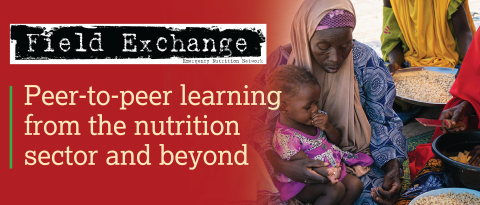Field Exchange 71 Editorial
Dear readers,
Welcome to the 71st edition of Field Exchange, featuring a typically wide range of content from practitioners and researchers. This issue looks beyond the more ‘usual’ nutrition approaches to delve into the social sciences, the use of private sector techniques, and considering bioenergy in the context of food security. All of this serves to remind us that the multifaceted nature of (mal)nutrition requires multisectoral and multisystem solutions.
Several of these articles highlight the importance of understanding context and keeping/placing communities at the heart of the design, planning, and implementation of nutrition interventions for them to be acceptable and appropriate. Titus et al, building upon their prototype intervention featured in Field Exchange 681, took a ‘user centred behavioural science’ approach to address barriers to Family MUAC and to optimise its use in real-world conditions in a pilot study in Mali. Yusuf et al adopted a ‘service design approach’ to adapting the provision of wasting treatment through the integrated community case management platform for implementation in Somaliland. A key learning point from the latter was the programme’s ability to learn in real time, adapting to data and operational challenges as they arose, rather than waiting for a pre-determined review period, as is common for many nutrition programmes and pilots.
Sauvegrain et al adopted an anthropological perspective to understand caregivers’ perception of their children’s diet and development. This article from Laos highlights the importance of understanding communities and ‘speaking the same language’, as not all intentions carry the same meaning. Additionally, local foods should be considered not only from a nutrition security and resilience angle but also for their cultural and symbolic qualities. Leading on from this, the article by Thurman et al explores how we can use private sector techniques more effectively to engage with communities and drive demand for healthy nutritious diets.
An article by Fracassi et al introduces what is perhaps a less familiar topic for many of us at Field Exchange - bioenergy and nutrition. Often the linkages between the two are seen as negative in terms of competition for resources such as land. However, this article highlights practices from the literature and case studies whereby bioenergy value chains can positively impact nutrition and food security. The authors also illustrate the need for more collaborative food systems approaches to address the complex and interdependent challenges of climate, health, and nutrition more sustainably.
Continuing the theme of resilient food systems, pilot findings from Malawi highlight that food insecurity, climate vulnerability, and poverty are key drivers of the poor nutrition situation across two districts, where 85% of households had experienced loss of crops due to droughts or floods in the previous 12 months. In addition, maternal mental health, an often-overlooked area, was also found to be associated with poor nutrition. The relationship between maternal depression and child nutrition is also explored in a study by Din et al, summarised here.
On a different note, in our last issue we published a summary of the recently updated World Health Organization guideline on the prevention and management of acute malnutrition. Building on this summary, we feature a views article based on a recent blog written by Marie McGrath that highlights how principles and practices for continuity of quality care for small and nutritionally at-risk infants under six months and their mothers, described in the MAMI Care Pathway approach, are embedded in the revised guideline.
Finally, we feature our usual array of summaries of recently published research and reports, covering topics ranging from climate change to school feeding to novel treatments for severe wasting, which we hope you find interesting and engaging. Happy reading!
Anne, Nicki, Phil, and Tom
1 https://www.ennonline.net/fex/68/optimisingmuacmali


